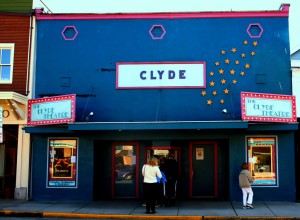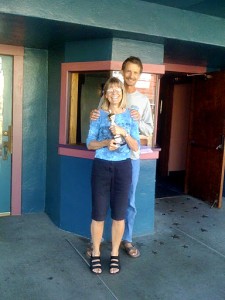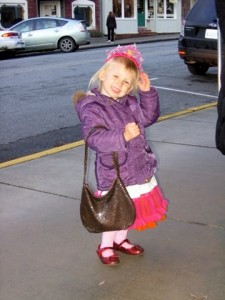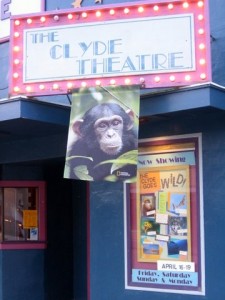
About the Clyde
Movies, South Whidbey Style, Since 1937
The Clyde Theatre was built in 1937—the height of the Depression–by Norman and Hazel Clyde. Although a lot more humble than the grand movie palaces being built in the big cities, the new theater was greeted warmly by folks on South Whidbey. The first movie to show at The Clyde when it opened September 16, 1937, was You Can’t Have Everything, starring Don Ameche. The discovery when screening the first reel of that film for The Clyde’s 50th anniversary party that the last line on the reel was “Just call me Blake,” provoked more than a few discussions about karma.
The community-minded Norm and Hazel ran The Clyde Theatre, as well as Clyde Motors and the Clyde Garage, for decades. Vandalism and other bad behavior caused Norm, then Town Sheriff too, to close the theater for a while in the 1960s. It was being leased and run on a very limited schedule by a local banker when Blake Willeford bought the theater from the Clydes in February of 1972.

Frequently asked questions about The Clyde
Can my son or daughter see an R-rated movie if they’re under 17?
That’s up to you. Parents may request in person or in writing that their son or daughter be admitted to The Clyde for an R-rated movie. The note should include the name of the film, the date, a signature, and a number where the parent may be reached. We reserve the right to try to talk you out of sending your child to a movie we think grossly inappropriate for the child’s age, but we believe the decision is ultimately a parent’s.
We will try to call the parents of under-age patrons without written or live permission to make sure the parents intend them to see this movie. If we cannot reach the parents, we will not be able to admit the student. Since we do not want it on our conscience if a kid is roving through Langley for two hours at night, we strongly urge parents to check the ratings of the movies their kids attend and make sure they have permission slips if a movie is rated R.
Will a parental note work for any R-rated movie?
No. Occasionally we will show a movie that especially seems to us to be appropriate for adults only. In that case we will note in the print and on-line schedules and in the taped phone message that we will be requiring proof of age for any students under 17 who are not physically accompanied by their parent or guardian into the movies. (And no, your older brother or your date do not count as a parent or guardian.)
What happens to patrons who act up at The Clyde?
We have a “three strikes” policy. If we feel you are being too noisy, we will ask you politely to keep it down. The second time we have to speak to you, we will ask you to move to another seat of our choosing. The third time we speak to you we will ask you to leave (no money back, but you can call your folks from our phone for a ride home). We may make mistakes in identifying the correct noisy person, so those sitting near a noisy person would be wise to move away or get them to shut up. There’s an exception to this policy: Anyone throwing anything in the theater will be asked to leave at once. No “three strikes” in this case—it’s a safety issue.
Who gets to sit in the balcony?
The balcony is usually reserved as a haven for adults, especially on Friday nights. Occasionally we allow kids upstairs with their parents, especially if they cannot find seats together downstairs, but we do ask them not to clamber loudly up and down the stairs during the movie.
Can I get a free refill if I spill my drink?
No, we won’t refill your drink if you spill it all over the floor. After all, we’re the ones who have to clean it up. Please use the cupholders attached to the seat in front of you, and keep the lids on the drinks.
How come The Clyde doesn’t show movies the day they open?
Movie studios distribute new films based on three things: how long you’ll play it, how many times you’ll show it a day, and how much you’re willing to pay for it. First-run movies are available to theaters that promise to show the film for a period of four to six weeks, show it several times a day, charge higher admissions, and pay about 90% of the box office gross (less a set amount for house expenses) to the distributor. One theater in the Seattle area actually turned over 100% of the gross in order to get one of the Star Wars films (they made a pile on the snack bar). Only a certain number of hard drives or prints of a film are made available—up to 4,000 for a big movie, and sometimes as few as 50 for a small one. Obviously, The Clyde is not a big enough market charging big enough prices to tie up a first-run print here. Nor would you, our patrons, like it if the same movie showed for a month—no matter how good it was!
Why doesn’t The Clyde snack bar have butter/ice/espresso?
Have you seen the size of that snack bar? We’re lucky we can fit two of us in there to work. We don’t have room for an ice-maker, butter-warmer, or espresso machine, and if you think the lines are slow now, imagine how slow they would be if you had to wait for all those fancy coffee drinks to be ordered and made. We also prefer to avoid the mess of that “butter” stuff—which is generally just soy oil flavored with real or artificial butter flavor. Who wants to pour thick soy oil all over their popcorn?
How do I arrange for birthday parties or for the wheelchair seat?
Call us at 730-7915 between 9 am and 9 pm (no earlier and no later) to make arrangements. For birthday parties we’ll want to know your name, phone number, what date, which show, how many kids, and where they want to sit. We’ll reserve the seats/rows requested until 10 minutes before showtime.
What should I do if I lose something at The Clyde?
If you think you’ve left something at the theater, call us at 730-7915 between 9 am and 9 pm (no earlier and no later), or stop in at the theater anytime we’re open. Someone is usually there about an hour before each show and 20-30 minutes after each one. We call as soon as we find a valuable item (like a wallet) if we are able to locate a name and phone number for the owner. We keep found items for six weeks and then move them on. If you recognize your scarf on me, let me know and I’ll give it back.
Where’s the best place to sit at The Clyde?
That all depends on your size (both height and width), your temperature preferences, and your vision/hearing. Shorter people can see better from the sides of the theater near the walls, as the sight lines go between chairs. Wider people might prefer one of our wider seats—look for the rows that have just six chairs rather than seven. If you get cold easily, sit in the balcony (heat rises) or under one of the ceiling heat vents. If you cannot hear well, skip the balcony unless you’re wearing a hearing-assisted device (available free at the snack bar) as the sound is not as good up there. And if you don’t attend the middle school, avoid the front rows on Friday nights.
How to purchase Clyde gift passes and SnackBarBucks
Gift passes are sold individually for $10 each, or $8 each for people 7-16.
We also have SnackBarBucks for $5. (Our prices are low, so $5 matters).
You can order Gift Passes and/or SnackBarBucks by mailing a check and your order information to The Clyde at P O Box 199, Langley WA 98260 or by sending your request to info@theclyde.net.
We don’t accept credit or debit cards, but we are willing to send out the tickets at the same time you send a check if time is short.
More then 85 years of showing movies, South Whidbey-style
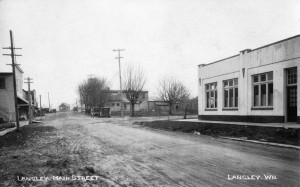
Langley’s First Street in 1923, fourteen years before the Clyde was built.
The Clyde Theatre was built in 1937–the height of the Depression–by Norman and Hazel Clyde. Although a lot more humble than the grand movie palaces being built in the big cities, the new theater was greeted warmly by folks on South Whidbey. The first movie to show at The Clyde when it opened September 16, 1937, was You Can’t Have Everything, starring Don Ameche. The discovery when screening the first reel of that film for The Clyde’s 50th anniversary party that the last line on the reel was “Just call me Blake,” provoked more than a few discussions about karma.
The community-minded Norm and Hazel ran The Clyde Theatre, as well as Clyde Motors and the Clyde Garage, for decades. Vandalism and other bad behavior caused Norm, then Town Sheriff too, to close the theater for a while in the 1960s. It was being leased and run on a very limited schedule by a local banker when Blake Willeford bought the theater from the Clydes in February of 1972.
Blake was newly out of three years in the Punjab of India with the Peace Corps, and really knew nothing about running a movie theater. His realtor aunt, Margaret Kish, somehow convinced him it was the perfect small business for a guy with two years of graduate school in philosophy under his belt. He experimented a lot over the next few years, showing a Shakespeare festival one winter, and adding foreign and art movies to the slate the next. He talked local artists into designing the printed calendars, which soon became standard décor on South Whidbey refrigerators.
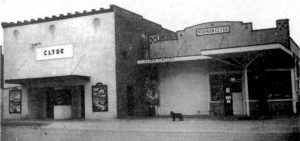
The new Clyde Theatre next to Clyde’s Garage
Blake added a stage for live performances of musical acts like street troubadour Jim Page, Country Joe McDonald, and Eric Tingstad, and the excellent productions of Island Theatre and FOOLS. Hundreds of local children have also made their stage debuts at The Clyde in the plays and revues of Martha Murphy’s Whidbey Children’s Theatre (including our own son Brook in 1986).
Lynn started as a sweeper and slowly worked her way up to Sunday night ticket seller, then girlfriend and bookkeeper, and finally became Blake’s wife and business partner in 1978. With marriage came the power to change the ugly colors of The Clyde, whose interior featured tan acoustic wallboard and red plastic leatherette seats with hard wooden backs, and whose exterior was an awful mustard color. After a few different color schemes The Clyde segued into its current soft rose interior and teal, aqua, rose, and purple exterior (paint choices that horrified the Design Review Board of the time).
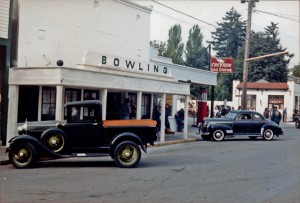
Filming of the movie Dixie Lanes briefly turned The Clyde into a bowling alley
Blake did an extensive seismic retrofit of the building in 1992 to make it safer for everyone. In 2002 the original 65-year-old seats found new homes on South Whidbey porches as more comfortable chairs were installed. Blake continually upgrades the equipment at The Clyde as well. He installed Dolby surround sound and switched to xenon bulbs from the old carbon-arc power supplies in 1985, and upgraded to Dolby Digital Sound in 2000. He added a commercial-quality digital projector and BluRay DVD player in 2009 so the theater could be rented during off-hours for conferences, parties, classes, etc. In 2011 he hauled out the 35mm projectors and converted the theater to digital cinema with the latest 7.1 Dolby digital sound. Now we can show movies from hard drive, DVD, and BluRay, as well as slide shows, videos, presentations, and other material from a laptop computer.
Just the facts, ma’am! All the basics you need to know about The Clyde
Currently we’re only showing movies Friday, Saturday, Sunday, and Monday at 7:30 pm.
Box office generally opens 30 minutes before showtime.
Occasionally we add matinees or late shows. Sometimes we change the showtimes due to a movie’s length. Watch for alerts here on the website or follow us on Facebook for updates.
TICKET PRICES
General Admission is $10, ages 7-16 is $8, and under 7 is free.
We take cash, checks, as well as credit and debit cards
(Gift passes can be purchased at the box office or requested by email)
LOCATION
The Clyde is located at 217 First Street in Langley WA. Click to view a map >
Need to contact us? Click here >
So how do movies get their ratings?
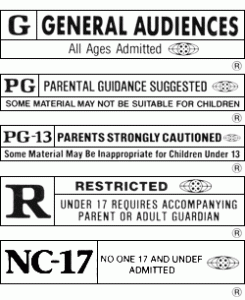 You may be surprised to learn that the ratings assigned by the Motion Picture Association of America (MPAA) are not laws—you can’t call the police if a theater unintentionally lets your 16-year-old into an R-rated movie. In fact the whole rating process is voluntary for filmmakers, and is sometimes skipped by the makers of smaller or foreign films.
You may be surprised to learn that the ratings assigned by the Motion Picture Association of America (MPAA) are not laws—you can’t call the police if a theater unintentionally lets your 16-year-old into an R-rated movie. In fact the whole rating process is voluntary for filmmakers, and is sometimes skipped by the makers of smaller or foreign films.
The MPAA first suggested this self-regulatory process as an industry-friendly alternative to heavy-handed government restrictions that varied from state to state and sometimes county to county. The MPAA is very clear that the only purpose of the MPAA rating system is to help parents decide whether or not to take a child to see a particular movie. At its website (www.mpaa.org/movieratings/about/index.htm) the MPAA says bluntly, “Ratings are meant for parents, no one else.”
We agree with the MPAA that parents bear the ultimate responsibility to protect their children from material that is not age-appropriate, and we urge parents to read about movies before they take their kids to them. While the MPAA board of 8-13 adults with parenting experience tries to represent mainstream American values, they may not represent your values in regard to yourparticular child.
What do the ratings mean?
A film’s rating may be influenced as much by marketing decisions as by content. A G rating is considered the kiss of death for preteens, so a filmmaker may add a minor curse word to get a more acceptable PG. On the other hand, some filmmakers will work with the MPAA ratings panel at snipping a second here and a second there to get a more commercial PG-13 rating rather than an R. That same last-minute editing may move a film from the hard-to-advertise NC-17 category to an R. Director Robert Altman famously fought for an R rating rather than a PG-13 for his 2001 filmGosford Park because he wanted to keep noisy teenaged boys out of his movie.
Here’s what the ratings mean to parents:
G means a film is suitable for general audiences. Anyone can see a G-rated film. A G rating does not mean that a film is relentlessly sunny, however. Many of us were traumatized at an early age by the death of Bambi’s mother or the meaness of the evil stepmothers in G-rated Disney films. But film incidents like these do become wonderful “teachable moments” for family discussions of death, evil, and less admirable character traits like jealousy and insecurity. A G rating does not necessarily mean a film is for children, it just means that there is nothing in the film that would offend them.
PG means that the film requires some parental guidance as to whether it is appropriate for the ages and development stages of individual kids. A PG film might have some scary moments that would be too much for a 3-year-old but fine for a first-grader, for instance a realistic character may be in peril. There may be all sorts of violence actually, as in the Star Wars movies, but not much gore.A PG-rated film may be a sweet movie that is essentially aimed at adults, or a very long movie. It might have subtitles, a challenge for younger or slower readers. It might have some use of the “s word.”
PG-13 means that the MPAA board thinks that the film is okay for kids over 13, but that parents are strongly urged to make their own decisions as to whether the movie will be appropriate for younger children. Oral or written permissions are not required by theaters for PG-13 films, as this is a “guidance only” situation. A movie may be rated PG-13 for:
- sexual innuendo
- premarital sex
- nudity that “is not sexually oriented”
- violence
- bad language (including the “f word” though using it as a verb or more than once gets you an R)
- adult themes such as domestic abuse or extramarital sex
- drug use content
- bathroom humor, or
- heavy suspense.
Some of these may be hot buttons for you, and some may be trivial. PG-13 films put a heavier responsibility on parents. That’s why we give you as much information as we can in our taped phone messages, in our on-line calendar, and through the on-line links for movie-going parents provided here.
R rating means that no one under 17 will be admitted without parental permission. Once again, this is not a law, but a self-policing strategy by the movie industry (which nonetheless intentionally markets some R-rated movies to younger kids). An R movie is intended for adults, and for these purposes 17-year-olds are considered to be adults. Movies may be rated R for a wide variety of reasons, from mild to really adult. It pays to check for the reasons for the rating.
R movies run the gamut. An R-rated movie may only use the “f word” once or twice, or it may contain so much cursing it makes your ears ache. A movie may be R because it shows some loving (nonexplicit) sexual behavior between two married people, unmarried people, or a gay couple, or because it shows a grueling rape or some kinkier stuff. It may be R for one brief but shocking scene of violence that is essential to the story or because of two hours of gratuitous gore. There have been some films that seemed to be rated R only because they required an adult attention span. Once again we urge parents to educate themselves about the movies their kids want to see. If you’re not sure about a movie, you may decide to see it together so that you can talk about any problematic issues brought up by the movie.
NC-17 means that no one aged 17 or under will be admitted to the movie with or without a parent or guardian. This rating was created to indicate a movie made for and intended for adults but not meant for porn palaces. An NC-17 movie is judged too strong for people who aren’t old enough to vote or serve in the military. It may contain more violence, sex, drug abuse, or “aberrational behavior” than an R-rated movie. We have shown only one or two NC-17 movies since the rating was invented, one of them an Oscar nominee.

